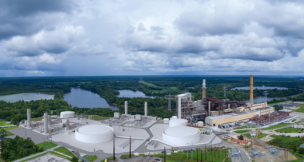Banking on towels
A Hong Kong company brings textile manufacturing to idle Bristol factory
Tim Thornton //March 2, 2018//
Banking on towels
A Hong Kong company brings textile manufacturing to idle Bristol factory
Tim Thornton //March 2, 2018//
When the Ball Corp.’s beverage packaging plant closed in 2016, it marked the end of 45 years of operation under three owners.
More than 200 people were employed there in July 2015, when the closing was announced. So, when American Merchant decided in December to make bath towels in the old factory, it was big news. The plant is expected to employ more than 400 people when it is running at capacity.
“That’s a big number,” says Bristol Mayor Kevin Mumpower. “You’ve really only got two or three companies here that even approach that kind of number … That would be one of the top five manufacturers in Southwest Virginia with 400 people. So that’s a big deal.”
Stephen Moret, president and CEO of the Virginia Economic Development Partnership, says the indirect jobs resulting from the plant’s reopening could push the impact “somewhere north of 600 jobs.”
“The vast majority of our small businesses get nearly all their sales from their local community, so if major employers close, it hurts them,” Moret says. “If new employers come to town or existing employers expand, it really helps them in a meaningful way. So that ripple effect really is real.”
Robert Burton, the chairman of American Merchant, says the company plans to have equipment in place by October, to operate trial runs through December and to begin production in January. The goal is to run three shifts, six days a week, with one day set aside for repair and maintenance.
“We want to move fast,” Burton says. “The earlier we can get it going, the better off the group will be.” He says the timetable is “aggressive, but we feel it’s achievable.”
American Merchant is a subsidiary of Merchant House International, a Hong Kong-based company that trades on the Australian Securities Exchange. The Bristol manufacturing plant will be its first in the U.S. The company plans to invest $19.9 million in the facility.
The project’s incentive package includes a $300,000 grant from the Commonwealth’s Opportunity Fund and $590,000 from the Tobacco Region Opportunity Fund. The company also is eligible for grants and other assistance from the Virginia Enterprise Zone Program, the Appalachian Regional Commission and the Virginia Jobs Investment Program.
That may seem like a lot of investment in a company’s first venture into a new sector, but Burton says he and American Merchant’s parent company know the field. “We’re obviously involved in the textile sector,” he says. “We have a wholly owned facility in southern China that manufactures kitchen towels.”
That factory concentrates on decorating and printing, but Burton says he’s familiar with weaving factories from his time as a buyer.
“I’ve been to every major towel manufacturer, probably, in the world,” he says. “So I’m familiar with the process and how towels are made. I probably was involved in about $60 million worth of purchasing or more of towels on an annual basis, as bath towels. So, we feel we have the knowledge of the sector to be successful.”
Even so, some people may wonder about the wisdom of backing a textile manufacturer anywhere in the United States.
“A lot of people are asking why come back to America to make this,” Burton says. Indeed, many textile plants throughout the Southeast fled to Central America or Asia in search of cheap labor. American Merchant is turning to machines instead. “We’re looking at a lot of automation wherever we can automate,” Burton says. “We’re bringing in state-of-the-art equipment throughout the manufacturing process.”
American Merchant considered a number of potential locations, mostly in the Southeast, according to Burton. One big requirement was to be near where yarn is spun, he says, and yarn is spun near where cotton is grown.
“I think everything really came together,” Burton says. “This was a place that wanted us. They had a history of manufacturing, and it was in the right location … It was a great facility in terms of size, space, location and we had a tremendous amount of support both from local and state officials. That kind of put it over the top for us.”
e














